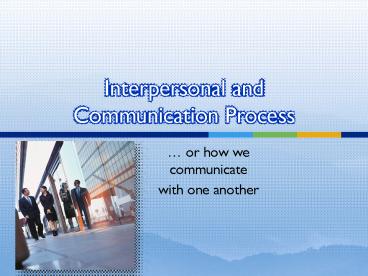Interpersonal and Communication Process - PowerPoint PPT Presentation
1 / 15
Title:
Interpersonal and Communication Process
Description:
'I feel silly when you dress up as a clown because ____.' 'I feel silly when you dress up as a clown because you trick me with your electric hand thingy. ... – PowerPoint PPT presentation
Number of Views:78
Avg rating:3.0/5.0
Title: Interpersonal and Communication Process
1
Interpersonal and Communication Process
- or how we communicate
- with one another
2
Overview
- In this presentation we will cover the following
- Active Listening Skills
- Eye contact, posture, and body language
- Paraphrasing, clarifying, and verifying
perceptions - Empathy, summarizing, and minimizing distractions
- I Statements
- Feel
- Event
- Resolution
- Following this presentation you will be asked to
practice these skills. - Be sure to follow along using your Student
Handout.
3
Active Listening
- When you are telling your friend a story, how do
you know they are listening?
4
Active Listening Skills
- Active listening skills are those behaviors that
tell someone who is talking that you are
listening to them. - There are two main categories of active listening
skills - Body Position
- Language
5
Body Position - Eyes
- When you are talking to someone, how do you know
they are listening to you? - Eye contact is very important for active
listening. - Humans communicate a lot with their eyes,
therefore if the eyes are wondering it is
probably a sign that the mind is not paying
attention. - Too much of a good thing make eye contact but
dont stare!
6
Body Body Language
- What is the closed off body posture?
- Crossed arms indicate that the listener is not
receptive to the speaker or the conversation. - Positive body language listener facing speaker,
open posture, relaxed, smiling, and head nodding.
7
Language - Paraphrasing
- Repeat after me paraphrasing is the act of
restating someones words back to them. - Paraphrasing shows you are listening.
- Paraphrasing shows your understanding of what the
speaker was saying. - So what is paraphrasing?
8
Language Verifying Perceptions
- Let me get this straight
- This is a common format for a verifying
perceptions sentence. - Verifying perceptions is used by a listener when
they are confused by the speaker and they want to
make sure they are following the conversation. - It also gives the speaker feedback.
- What are other ways you have tried to verify
perceptions when listening to your friends?
9
Language Clarifying
- Clear as mud
- Sometimes conversations can get confusing.
- So and so did such and such which lead you know
who to say you dont even want to know what! - Clarifying sentences can help you, the listener,
lay it all out for the speaker to make sure
everything is clear. - In normal, clear conversations, clarifying can
just make sure that you and the speaker agree.
10
Language - Summarizing
- In conclusion
- Summarizing brings the main ideas into clear
focus, and ends a conversation. - Does not bring new ideas out.
- Someone summarize what we have learned so far
- Dont get too excited, we still have some
learning to do
11
Language - Empathy
- Do you have a friend who is just really bad at
listening to you and understanding how you feel? - We would say that they are not very empathetic.
- Not pathetic! Empathetic!!
- This means that they do not recognize and connect
with your feelings and emotions. - So like the kid outside the principals office,
you dont think that anyone is listening. - How do you show empathy with your friends?
12
Language Minimize Distractions
- Hang on would ya? Ive got a call
- How many of you have been interrupted by a friend
who wasnt paying attention to you? - How does a situation like this impact you?
- Minimizing distractions is more than just cell
phones, and making eyes with another classmate
while a friend is talking. - It has to do with hearing and respecting the
other person. - What distracts you from a conversation?
- How might you minimize these?
13
I Statements
- How do you feel when someone picks on you?
- You probably started your answer off with, When
I am picked on I feel - This is what we call an I statement.
- These statements always begin with I.
- These statements help to convey your feelings
without offending the opposing party. And they
really work! - Theres a general formula for I statements
14
I Statement formula
- Use the formula in 1 to construct a sentence of
your own. Its easy! - I feel _(feeling)_ when you _(event)_ because
_(impact on you)_ . - I feel silly when you ____ because ____.
- I feel silly when you dress up as a clown
because ____. - I feel silly when you dress up as a clown
because you trick me with your electric hand
thingy.
15
Summarizing
- Ok now finally try summarizing!
- What have we learned so far!
- We are now going to partner up to practice these
skills.































